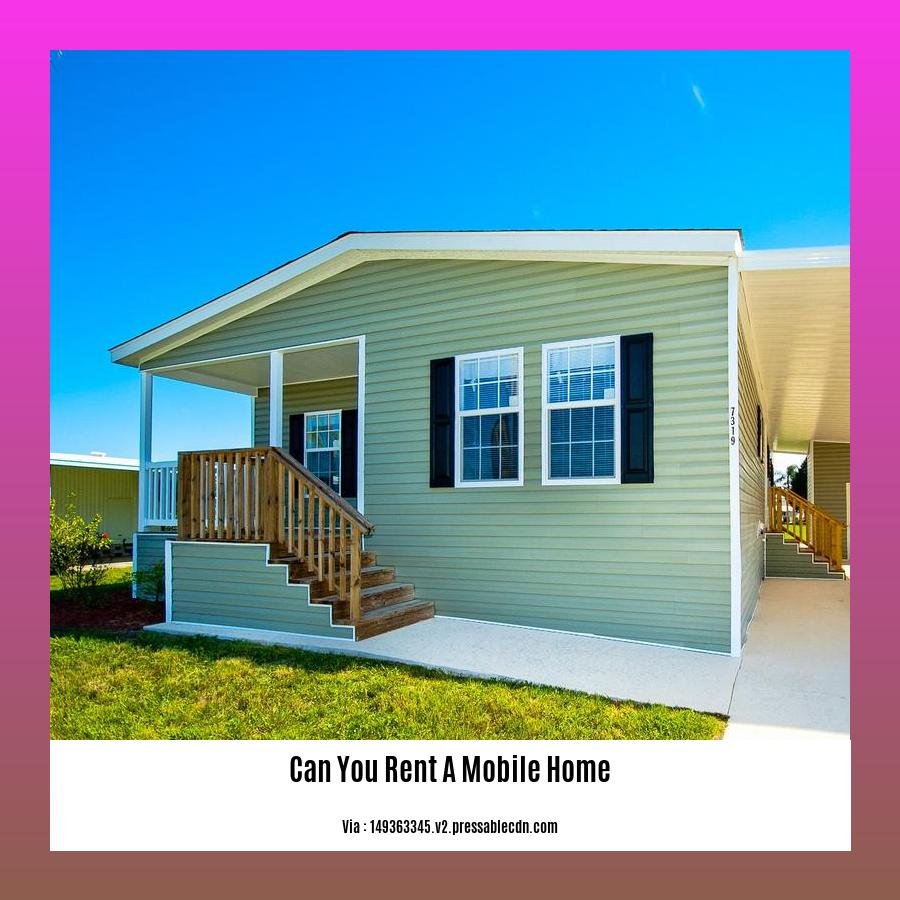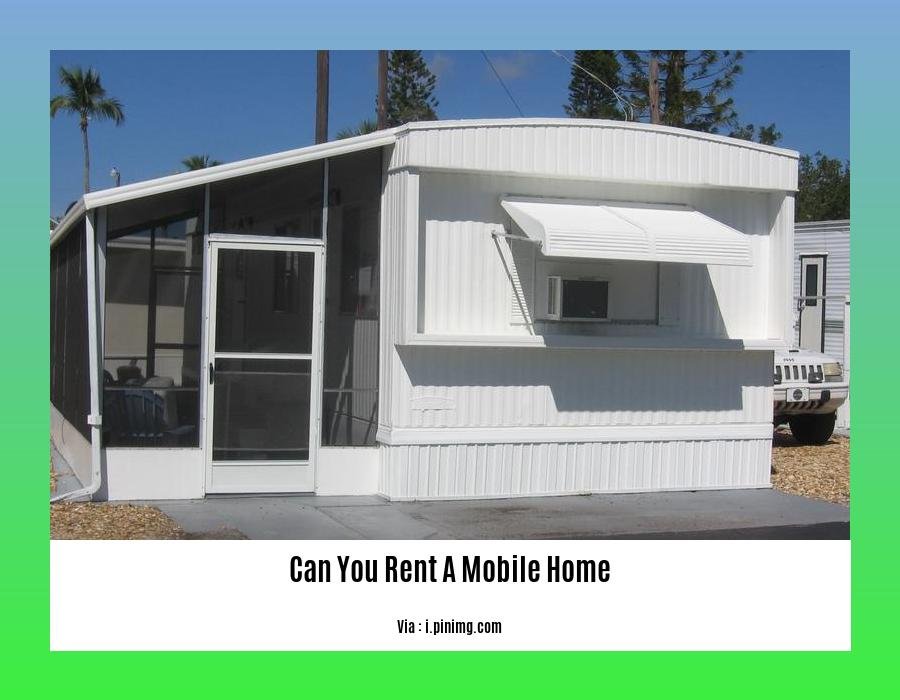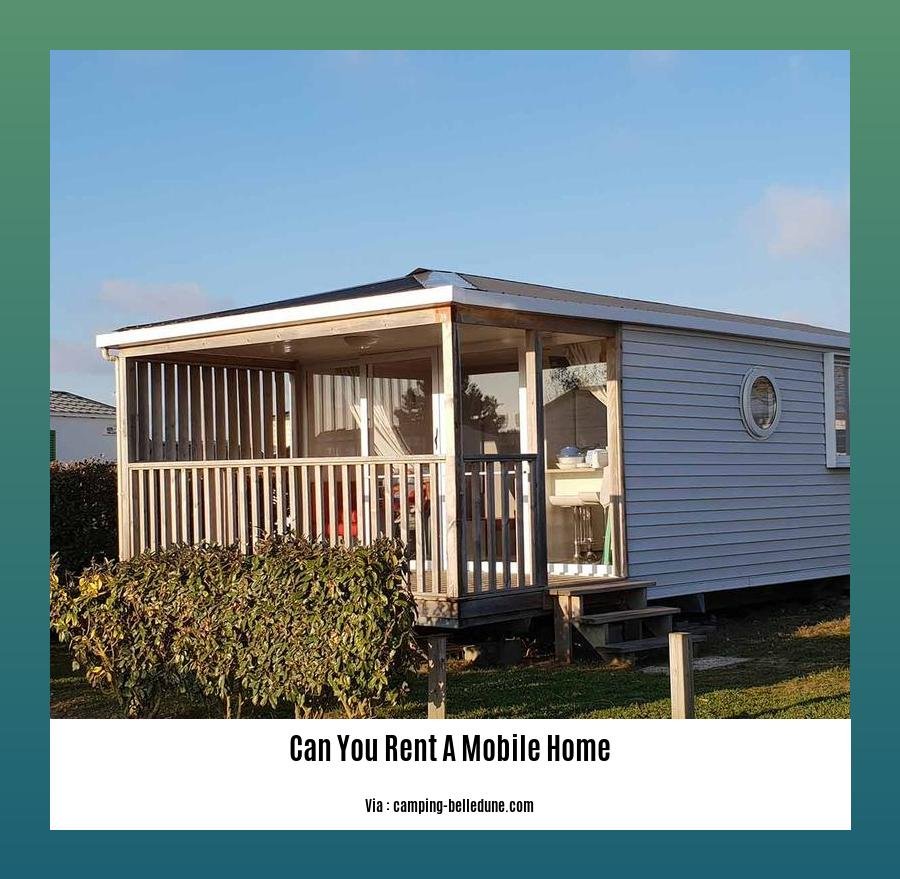Considering renting a mobile home? Dive into our comprehensive guide titled [Can You Rent a Mobile Home: Essential Considerations and Steps to Follow] to navigate the unique aspects of mobile home rentals. From understanding park regulations to securing financing options, we provide invaluable insights and a step-by-step approach to help you make informed decisions and ensure a successful rental experience.
Key Takeaways:
- You can rent a mobile home in three ways:
- On private property.
- In a mobile home community with a lot.
-
Owned by someone else in a mobile home community.
-
The most common options are renting a mobile home and lot in a mobile home park or renting a mobile home owned by someone else in a mobile home park.
Can You Rent a Mobile Home: Considerations and Steps to Follow

Renting a mobile home can be a great option for those seeking affordable and flexible housing. Whether you’re a first-time renter or considering downsizing, mobile homes offer unique advantages. Let’s delve into whether renting a mobile home aligns with your needs and guide you through the process.
Benefits of Renting a Mobile Home:
-
Affordability: Mobile homes are generally more affordable than traditional housing, making them an excellent choice for budget-conscious individuals.
-
Flexibility: Renting a mobile home provides flexibility in terms of location and lifestyle. You can move your home to a different park if you need a change of scenery or are relocating for work.
-
Low Maintenance: Mobile home parks often handle maintenance and repairs, eliminating the burden of upkeep for renters.
Considerations Before Renting a Mobile Home:
-
Park Regulations: Mobile home parks have specific rules and regulations that renters must comply with. Ensure you understand the park’s rules before committing to a rental agreement.
-
Zoning Laws: Zoning laws may restrict where you can place a mobile home. Research the local zoning laws to determine if you can legally place a mobile home on a desired property.
-
Resale Value: Unlike traditional homes, mobile homes depreciate over time. This means that if you ever decide to sell your mobile home, you may not get back the full amount you paid for it.
Steps to Rent a Mobile Home:
-
Research and Choose a Location: Select a mobile home park that suits your needs and preferences. Consider factors like proximity to amenities, park rules, and community atmosphere.
-
Find a Suitable Mobile Home: Browse available mobile homes for rent in the park of your choice. Look for homes that fit your budget, space requirements, and desired features.
-
Contact the Mobile Home Park Management: Inquire about the availability of rental mobile homes and schedule a visit to see the property.
-
Review the Rental Agreement: Carefully review the rental agreement before signing. Ensure you understand the terms of the lease, including rent, security deposit, and any additional fees.
-
Complete the Application Process: Submit a rental application, along with any required documents, such as proof of income and a credit check.
-
Move into Your Mobile Home: Once your application is approved, you can move into your mobile home and start enjoying your new living space.
Rental Options for Mobile Homes:
| Rental Option | Details |
|---|---|
| Rent a Mobile Home on Private Property: Rent a mobile home located on private property from the property owner. | |
| Rent a Mobile Home and Lot in a Mobile Home Community: Rent a mobile home and the lot it is situated on within a mobile home community or park. | |
| Rent a Mobile Home Owned by Someone Else in a Mobile Home Community: Rent a mobile home owned by another individual within a mobile home community or park. |
Conclusion:
Renting a mobile home can be a rewarding experience, offering affordability, flexibility, and a sense of community. By carefully considering your needs, researching potential locations, and following the necessary steps, you can find the ideal mobile home rental that aligns with your lifestyle and budget.
Remember, renting a mobile home comes with unique considerations and responsibilities. Familiarize yourself with the park regulations, zoning laws, and rental terms before making a decision. With proper research and preparation, you can enjoy the benefits of mobile home living while maintaining your desired lifestyle.
To get the cosiest sleep, check out the blanket bed sheet set. You can pick the best bridal bed set that’ll complement your bedroom. Make your wedding memorable by buying the perfect bridal bed sheets. Choose from our exclusive collection of bridal wedding dresses to look stunning on your special day. Find all the information you need to know about putting a tiny house on your property. Before starting any new home construction project, it’s crucial to have a checklist to ensure a smooth and successful build.
Types of mobile homes available

Have you thought about renting a mobile home but don’t know where to start? Learning about the different types of mobile homes available is an important first step. Let’s dive into the various options to help you make an informed decision.
Key Takeaways:
-
Understand the different types of mobile homes available.
-
Consider your budget and lifestyle to choose the best option.
-
Research local regulations and park availability before you rent.
1. Single-Wide Mobile Homes:
Picture a cozy and compact home that’s perfect for individuals or small families. These mobile homes typically range from 10 to 14 feet wide and offer a simple layout with essential living spaces. They’re great for those seeking affordability and low-maintenance living.
2. Double-Wide Mobile Homes:
Double-wide mobile homes offer more space and versatility, making them suitable for families or individuals who need extra room. These homes are generally between 20 and 24 feet wide and feature two sections joined together. They provide more bedrooms, bathrooms, and living areas compared to single-wide models.
3. Triple-Wide Mobile Homes:
If you’re looking for the most spacious and luxurious mobile home option, triple-wide models are the way to go. These homes are typically 30 feet or wider and consist of three sections connected together. They offer ample space for families, multi-generational living, or those who desire a more comfortable and expansive living environment.
4. Manufactured Homes:
Manufactured homes are built in factories and transported to the desired location in sections. They’re often larger and more permanent than traditional mobile homes and can be customized to suit specific needs and preferences. Manufactured homes are subject to strict building codes and standards, ensuring quality and durability.
5. Park Model Mobile Homes:
Park model mobile homes are designed for seasonal or recreational use. They’re smaller than traditional mobile homes, typically ranging from 8 to 12 feet wide and 32 to 40 feet long. These homes are often found in campgrounds or RV parks and provide a comfortable and convenient living space for short-term stays or weekend getaways.
Remember, the type of mobile home you choose should align with your budget, lifestyle, and needs. Consider factors like space requirements, desired amenities, and local regulations before making a decision.
References:
The 9 Different RV Types Explained [Visually]
Types of Mobile Homes – Manufactured vs. Modular
Process of Renting a Mobile Home: A Comprehensive Guide
Planning to rent a mobile home? We’ll clarify the ins and outs of the process, from finding the right place to signing the lease so you can make an informed decision.
Key Takeaways:
- Cost-Effective: Mobile homes offer a more budget-friendly option compared to traditional housing.
- Flexibility: A mobile home provides the freedom to relocate when needed.
- Community Living: Renting in a mobile home community fosters a sense of belonging and camaraderie.
- Research Local Laws: Familiarize yourself with zoning regulations and park rules that apply to mobile homes.
Step-by-Step Guide to Renting a Mobile Home:
-
Explore Your Options: Begin by researching available mobile homes for rent in your preferred area. You can find listings online, through real estate agents, or by visiting mobile home communities directly.
-
Choose Your Community Wisely: Select a mobile home community that suits your lifestyle and budget. Consider factors like location, amenities, community rules, and proximity to essential services.
-
Inspect the Mobile Home: Before committing, thoroughly inspect the mobile home to assess its condition. Look for signs of damage, leaks, or any issues that need addressing.
-
Review the Lease Agreement: Carefully read and understand the terms of the lease agreement. Pay attention to details like the rent amount, security deposit, lease duration, and any additional fees associated with renting the mobile home.
-
Finalize the Rental Agreement: Once you’re satisfied with the terms of the lease agreement, sign it and provide the required security deposit. This finalizes the rental process, and you can move into your new mobile home.
Making the Most of Mobile Home Living:
- Stay Informed: Keep yourself updated on community rules, events, and any changes to your lease agreement or park regulations.
- Maintain Your Home: Regularly clean and maintain your mobile home to keep it in good condition and avoid any issues with the landlord or community management.
Citation:
- Renting a Mobile Home: A Guide
- Can You Rent A Mobile Home? Pros & Cons Of Renting
Tips for finding a reputable mobile home park
Finding a reputable mobile home park is key to a pleasant and hassle-free mobile home living experience. Here are some tips to help you in your search:
Key Takeaways:
-
Explore Online Listings: Renting a mobile home can be an affordable option for those seeking a place to live. There are two primary ways to rent a mobile home: from a private property owner or within a mobile home community.
-
Ask About the Park’s Rules and Regulations: Rigorous research and due diligence are essential when renting a mobile home. To ensure a positive experience, research the park’s rules and regulations to ensure they align with your lifestyle and expectations.
-
Thoroughly Research the Park’s Management: Conduct thorough research on the park’s management team to gauge their responsiveness, professionalism, and overall approach to park maintenance and resident concerns.
-
Read Reviews and Testimonials: Leasing a mobile home in a reputable park is crucial for a positive experience. Reading reviews and testimonials from current and former residents can offer valuable insights into the park’s management, maintenance, and overall living conditions. Consider visiting online forums and review websites to gather comprehensive feedback.
-
Verify the Park’s Amenities and Services: When choosing a mobile home park, carefully examine the amenities and services offered. A reputable park typically provides well-maintained facilities, such as a clubhouse, laundry facilities, swimming pool, and playground, contributing to an enhanced living experience.
-
Probe into the Park’s Security Measures: Consider the park’s safety and security measures. Ensure that the park has adequate lighting, security patrols, and controlled access to maintain a secure environment for residents.
-
Visit the Park Personally: Don’t rely solely on online research and reviews. Schedule a visit to the mobile home park to experience it firsthand. Observe the overall condition of the park, its facilities, and the surrounding area.
Sources:
- How to Find a Great Mobile Home Park: 7 Tips – RVshare
- How to Find the Best Mobile Home Park for You
FAQ
Q1: Is it possible to rent a mobile home?
A1: Yes, renting a mobile home is possible, but it may be challenging compared to renting an apartment or a house in the general rental market.
Q2: What are the different options for renting a mobile home?
A2: There are two main options for renting a mobile home:
- Renting a mobile home on private property.
- Renting a mobile home and lot in a mobile home community.
- Renting a mobile home owned by someone else in a mobile home community.
Q3: What are the benefits of renting a mobile home?
A3: Renting a mobile home has several advantages over renting an apartment or a house, including:
- More affordability
- More space
- More amenities
- A sense of community
Q4: What are the drawbacks of renting a mobile home?
A4: There are some potential drawbacks to renting a mobile home, such as:
- Difficulty in finding available rentals
- Strict rules and regulations
- Less desirable locations
- Susceptibility to damage from severe weather
Q5: What should I consider when renting a mobile home?
A5: Before renting a mobile home, it’s crucial to consider factors such as:
- The cost of rent and associated fees
- The condition of the mobile home
- The location of the mobile home
- The rules and regulations of the mobile home community (if applicable)
- Whether the home is in a mobile home park
- The Best Battery Picture Lamps for Effortless Artwork Illumination - April 1, 2025
- Double Sink Bath Vanity Tops: A Buyer’s Guide - April 1, 2025
- Bath Towel Measurements: A Complete Guide to Choosing the Right Size - April 1, 2025










